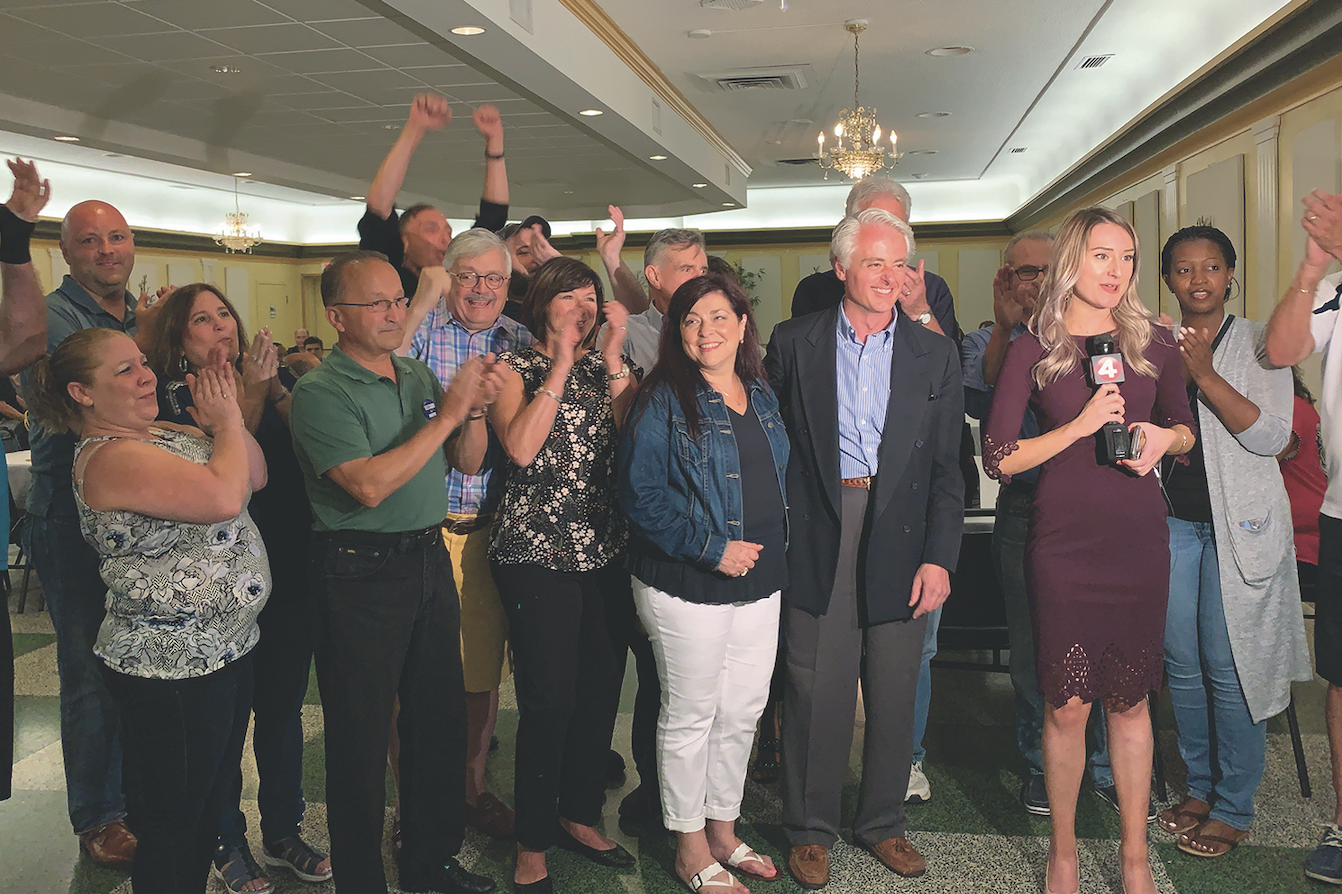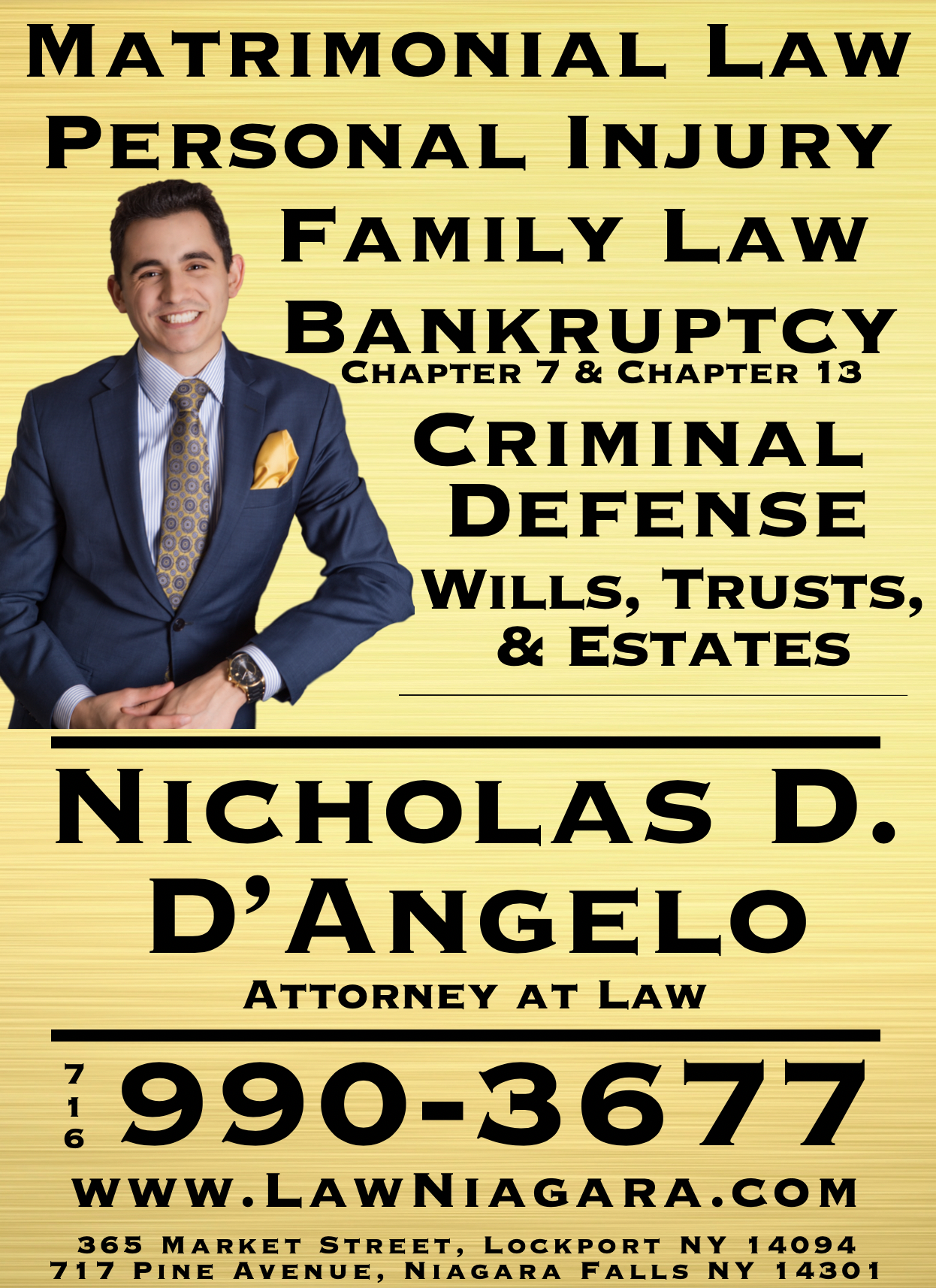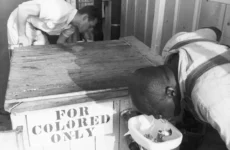Please click the link below to subscribe to a FREE PDF version of each print edition of the Niagara Reporter
http://eepurl.com/dnsYM9

Democratic candidate Robert M. Restaino, photographed above, after being declared the primary election winner against fellow democratic candidate Seth Piccirillo.
By: Robert M. Restaino
Candidate for Mayor of Niagara Falls
To say the least, the last four months of my life have been challenging, exhausting, and very rewarding. I am extremely gratified over the voter support I received in the Democratic primary election for Mayor of Niagara Falls. I am both honored and humbled by the continued support I have received from the voters of Niagara Falls during my last two campaigns for a seat on the Board of Education as well as this recent primary. Now, over the next few months I will continue to meet with voters at their doors to discuss my vision for a collaborative governing process.
After spending time with voters during the primary campaign, I now firmly believe that before our elected officials can begin to address the city’s financial and governing problems, the people of Niagara Falls must first decide and articulate what type of city they want to have. The first step in this process will be the development of a genuine sense of “community.” The divisive force of one neighborhood isolating itself and competing against other neighborhoods for local resources and services must end.
The people of Niagara Falls must specifically define the nature of “community.” Most importantly, the task of leading that discussion and social transformation will belong to the candidate chosen in the November election. The people of Niagara Falls must show themselves as being committed to a “community” which is inclusive of all citizens regardless of neighborhood and cultural background. In this new sense of “community,” the people of this city will understand that all residents are equal citizens who have a shared history and will forge a shared future. This is the concept upon which my platform of collaborative governing is built.
This sense of “community” must extend beyond the borders of our city to include the first ring suburbs of Niagara Falls. The political leaders of these municipalities must come to a collective agreement that the entire area of western Niagara County has a common history which is the basis for a shared successful future….as I have said, we are stronger together!!
During the upcoming general election campaign, the citizens of Niagara Falls will be exposed to political rhetoric that encourages everyone to think of themselves first which will only serve to continue the divisiveness among the neighborhoods of this city. It’s true that the City of Niagara Falls was “constructed” from a number of independent towns and villages that had a variety of ethnic and cultural backgrounds. However, to play to that diverse background as the basis of a campaign platform will only focus people’s attention on the competitive view of neighborhood versus “community.”
As mayor, I will challenge the citizens of this city and the surrounding municipalities to answer a simple question: “Will we be better or worse for pursuing a competitive ‘us versus them’ neighborhood mentality or for embracing a collaborative ‘community’ focused approach to local government”? As mayor, I will engage the political leaders of our first ring suburbs and school districts to analyze the competitive method of securing governmental resources and delivering services as opposed to a collaborative system of maximizing existing resources with a cost efficient delivery of basic services. As mayor, I will challenge our local business owners, large and small, to develop a list of critical concerns that local governments can reasonably address in order to create a business climate that rewards collaboration and promotes expansion.
My critics will challenge me to provide the specific details of my collaborative view of local government. I welcome that challenge. One area often discussed but receiving little attention is the duplication of citizen services provided by various municipal departments labeled as “general government.” Average expenses associated with this category of governmental operations for the last three years in Niagara Falls have been approximately $7.7 million dollars. How many taxpayer dollars are being spent on “general government” services by the towns of Lewiston, Niagara, and Wheatfield? Are there economies of scale that can be experienced through a collaborative delivery of these functions?
Shouldn’t there be a collaborative effort for the promotion of water-related tourism associated with the Niagara River? Shouldn’t there be a collaborative effort to rehabilitate the infrastructure essential for the movement of people and goods in western Niagara County? Shouldn’t there be a collaborative effort to enhance the opportunities to expand the retail shopping experiences for our local residents, regular Canadian visitors, and seasonal tourists? There will be no movement to address these concerns if someone doesn’t first pose these questions to local governmental leaders. I realize that some may say it can never work, but unless we explore new ways for all of our communities to more effectively and efficiently deliver essential services, we will never achieve our greatest potential. As Mayor of Niagara Falls, I plan to pose the questions and challenge my colleagues to join with me in fashioning the collaborative responses to them.
The central question of my primary campaign was “Who is best prepared to govern?” I believe Democratic voters answered that question. Now it’s up to voters of all affiliations to consider it.





















